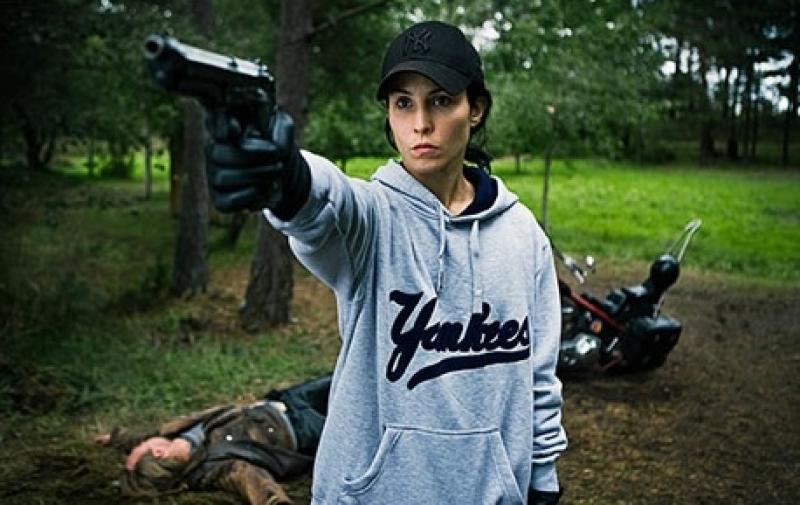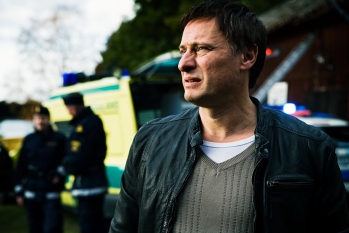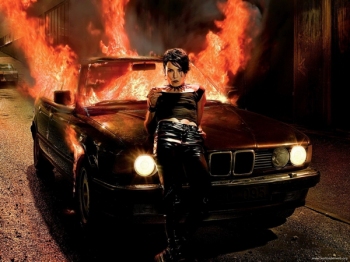The Girl Who Played With Fire | reviews, news & interviews
The Girl Who Played With Fire
The Girl Who Played With Fire
Larsson's novel has been eviscerated, leaving bad pulp fiction

This middle adaptation of Stieg Larsson’s Millennium crime trilogy will be followed almost instantly by the last. Lisbeth Salander (Noomi Rapace), the elfin abuse victim and avenger who is the heart of the Larsson phenomenon, remains compelling.
Apart from Salander, Tattoo had several strengths which stuck in the mind: an intricate and satisfying story stretching back to Forties Swedish Nazism, and bluntly extreme sexual violence which it’s hard to imagine next year’s Hollywood remake with Daniel Craig having the nerve to match. It felt like a window on a grubby, authentic Swedish world. The relationship between dour, saggy investigative reporter Mikael Blomkvist (Michael Nyqvist) and Salander was also frank and intriguing.
This time, the pair meet only in the last minute, as Salander goes on the run, framed for the murder of both her repulsive rapist-guardian Bjurman, and a young journalist and his girlfriend, who were helping Blomkvist investigate sex traffickers with links high in the Swedish state. Blomkvist (pictured below right) and Salander each try to clear her name by hunting Zalachenko, a Cold War Russian assassin who defected, thinking he’s the real killer.
 But unlike in the first film, the thematic trails all go cold. Sweden’s murky part in trafficking and spying, the underside to its pristine socialist utopia that both Henning Mankel and Larsson have made recently familiar, holds no interest here. The guts of Larsson’s fat novel have been eviscerated, leaving only the absurd contrivances of bad pulp fiction.
But unlike in the first film, the thematic trails all go cold. Sweden’s murky part in trafficking and spying, the underside to its pristine socialist utopia that both Henning Mankel and Larsson have made recently familiar, holds no interest here. The guts of Larsson’s fat novel have been eviscerated, leaving only the absurd contrivances of bad pulp fiction.
The hideously scarred Zalachenko, when he appears, steals narrative elements from The Empire Strikes Back and Thomas Harris’s (and Ridley Scott’s) Hannibal. His blond henchman, who feels no pain, is a Bond villain composite. Compared to Rapace’s incarnation of Salander, they are so much papier mâché. Wearing black make-up over a white scar, surviving burial, beatings and bullets by sheer moral force, she is an anti-misogynist Batman, a vigilante operating by a fantasy feminist code. The final, bloodied image of her has a savage authority that leaves the rest of the film quaking.
 Daniel Alfredson (the less talented brother of Let the Right One In director Tomas) shoots this like the TV movie it was originally meant to be. His one attempt at style is an embarrassing, slow-mo fight scene, full of bone-crunching martial arts leaps like bad Van Damme. Good luck if you haven’t seen the first film, as Fire feels like the middle of a book, reliant on previous events and suggesting future ones, with few independent strengths. It doesn’t have a beginning or climax, just a start and stop, while they change reels for The Girl Who Kicked the Hornet’s Nest.
Daniel Alfredson (the less talented brother of Let the Right One In director Tomas) shoots this like the TV movie it was originally meant to be. His one attempt at style is an embarrassing, slow-mo fight scene, full of bone-crunching martial arts leaps like bad Van Damme. Good luck if you haven’t seen the first film, as Fire feels like the middle of a book, reliant on previous events and suggesting future ones, with few independent strengths. It doesn’t have a beginning or climax, just a start and stop, while they change reels for The Girl Who Kicked the Hornet’s Nest.
Unless that’s a considerable improvement, the Hollywood remake can’t come soon enough. And the Millennium phenomenon, which has been so instantaneous, will prove as lasting as the hula-hoop.
- The Girl Who Played With Fire is now on general release
- Find Stieg Larsson's Millennium books on Amazon
Watch the Nordic trailer (better than the official UK one) on YouTube:
The future of Arts Journalism
You can stop theartsdesk.com closing!
We urgently need financing to survive. Our fundraising drive has thus far raised £49,000 but we need to reach £100,000 or we will be forced to close. Please contribute here: https://gofund.me/c3f6033d
And if you can forward this information to anyone who might assist, we’d be grateful.

Subscribe to theartsdesk.com
Thank you for continuing to read our work on theartsdesk.com. For unlimited access to every article in its entirety, including our archive of more than 15,000 pieces, we're asking for £5 per month or £40 per year. We feel it's a very good deal, and hope you do too.
To take a subscription now simply click here.
And if you're looking for that extra gift for a friend or family member, why not treat them to a theartsdesk.com gift subscription?
more Film
 Bugonia review - Yorgos Lanthimos on aliens, bees and conspiracy theories
Emma Stone and Jesse Plemons excel in a marvellously deranged black comedy
Bugonia review - Yorgos Lanthimos on aliens, bees and conspiracy theories
Emma Stone and Jesse Plemons excel in a marvellously deranged black comedy
 theartsdesk Q&A: director Kelly Reichardt on 'The Mastermind' and reliving the 1970s
The independent filmmaker discusses her intimate heist movie
theartsdesk Q&A: director Kelly Reichardt on 'The Mastermind' and reliving the 1970s
The independent filmmaker discusses her intimate heist movie
 Blu-ray: Wendy and Lucy
Down-and-out in rural Oregon: Kelly Reichardt's third feature packs a huge punch
Blu-ray: Wendy and Lucy
Down-and-out in rural Oregon: Kelly Reichardt's third feature packs a huge punch
 The Mastermind review - another slim but nourishing slice of Americana from Kelly Reichardt
Josh O'Connor is perfect casting as a cocky middle-class American adrift in the 1970s
The Mastermind review - another slim but nourishing slice of Americana from Kelly Reichardt
Josh O'Connor is perfect casting as a cocky middle-class American adrift in the 1970s
 Springsteen: Deliver Me From Nowhere review - the story of the Boss who isn't boss of his own head
A brooding trip on the Bruce Springsteen highway of hard knocks
Springsteen: Deliver Me From Nowhere review - the story of the Boss who isn't boss of his own head
A brooding trip on the Bruce Springsteen highway of hard knocks
 The Perfect Neighbor, Netflix review - Florida found-footage documentary is a harrowing watch
Sundance winner chronicles a death that should have been prevented
The Perfect Neighbor, Netflix review - Florida found-footage documentary is a harrowing watch
Sundance winner chronicles a death that should have been prevented
 Blu-ray: Le Quai des Brumes
Love twinkles in the gloom of Marcel Carné’s fogbound French poetic realist classic
Blu-ray: Le Quai des Brumes
Love twinkles in the gloom of Marcel Carné’s fogbound French poetic realist classic
 Frankenstein review - the Prometheus of the charnel house
Guillermo del Toro is fitfully inspired, but often lost in long-held ambitions
Frankenstein review - the Prometheus of the charnel house
Guillermo del Toro is fitfully inspired, but often lost in long-held ambitions
 London Film Festival 2025 - a Korean masterclass in black comedy and a Camus classic effectively realised
New films from Park Chan-wook, Gianfranco Rosi, François Ozon, Ildikó Enyedi and more
London Film Festival 2025 - a Korean masterclass in black comedy and a Camus classic effectively realised
New films from Park Chan-wook, Gianfranco Rosi, François Ozon, Ildikó Enyedi and more
 After the Hunt review - muddled #MeToo provocation
Julia Roberts excels despite misfiring drama
After the Hunt review - muddled #MeToo provocation
Julia Roberts excels despite misfiring drama
 London Film Festival 2025 - Bradley Cooper channels John Bishop, the Boss goes to Nebraska, and a French pandemic
... not to mention Kristen Stewart's directing debut and a punchy prison drama
London Film Festival 2025 - Bradley Cooper channels John Bishop, the Boss goes to Nebraska, and a French pandemic
... not to mention Kristen Stewart's directing debut and a punchy prison drama
 Ballad of a Small Player review - Colin Farrell's all in as a gambler down on his luck
Conclave director Edward Berger swaps the Vatican for Asia's sin city
Ballad of a Small Player review - Colin Farrell's all in as a gambler down on his luck
Conclave director Edward Berger swaps the Vatican for Asia's sin city

Add comment